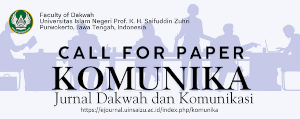Hubungan Persepsi Terhadap Teknik Statistik dengan Minat Melakukan Penelitian Kuantitatif pada Mahasiswa Fakultas Dakwah IAIN Purwokerto
DOI:
https://doi.org/10.24090/komunika.v11i2.1372Keywords:
Perception Theory, Student, Statistics, Quantitative Research, DakwahAbstract
Background of this study is a tendency of quantitative approach which is rarely encountered during student’s thesis of Dakwah Faculty IAIN Purwokerto. This is partly due to the usage of statistical techniques as the analysis tools. This study is a survey research, conducted in random sampling techniques with 38 respondents. The data is collected by using observation, questionnaire, interview and documentation techniques. The data is analyzed and calculate using Pearson’s Product Moment correlation procedures in Microsoft Excell and SPSS. Conclusion of the study is that “There is no correlation between the perception of statistical techniques and interest in using quantitative research towards student of Dakwah Faculty IAIN Purwokertoâ€, with the result of rxy, 0,247, as interpreted as a low correlation. The result is then consulted with Product Moment’s r table and it shows that the value of rxy is less than on the r table, both in 5% and 1 % significance level. There are lots of them have perceptions that statistical procedures are difficult and so they have less interest in conducting final thesis using quantitative methodology, with the reason that the research problem is not suitable with the quantitative methods. They have hope of assistance from lecturer or possibility in using SPSS techniques.Downloads
Download data is not yet available.
References
Arikunto, S. (2002). Prosedur Penelitian Suatu Pendekatan Praktik. Jakarta: Rineka Cipta.
Djamarah, S. B. (2002). Psikologi Belajar. Jakarta: Rineka Cipta.
Hadi, S. (1991). Metodologi Penelitian Research Jilid 3. Yogyakarta: Andi.
Hasan, I. (2004). Analisis Data Penelitian dengan Statistik. Jakarta: Bumi Aksara.
Jaelani, A. (1999). Membuka Pintu Rezeki. Jakarta: Gema Insani Press.
Meleong, L. J. (2007). Metode Penelitian Kualitatif. Bandung: Remaja Rosdakarya.
Poerwadarminta, W. (1982). Kamus Umum Bahasa Indonesia. Jakarta: Balai Pustaka.
Purwanto. (2009). Evaluasi Hasil Belajar. Yogyakarta: Pustaka Pelajar.
Schunk, D. H., & et.al. (2010). Motivation in Education Theory, Research and Application. London: Pearson Education.
Sedarmayanti, & Hidayat, S. (2002). Metodologi Penelitian. Bandung: Mandar Maju.
Shaleh, A. R., & Wahab, M. A. (2005). Psikologi Suatu Pengantar dalam Perspektif Islam. Jakarta: 2005.
Singarimbun, M. (1989). Metode Penelitian Survai. Jakarta: LP3ES.
Sudijono, A. (2012). Pengantar Statistik Pendidikan. Jakarta: Rajawali Press.
Sugiyono. (2012). Metode Penelitian Pendidikan Pendekatan Kuantitatif dan R&D. Bandung: Alfabeta.
Usman, H., & Akbar, P. S. (2003). Pengantar Statistika. Jakarta: Bumi Aksara.
Walgito, B. (1992). Pengantar Psikologi Umum. Yogyakarta: Andi.
Djamarah, S. B. (2002). Psikologi Belajar. Jakarta: Rineka Cipta.
Hadi, S. (1991). Metodologi Penelitian Research Jilid 3. Yogyakarta: Andi.
Hasan, I. (2004). Analisis Data Penelitian dengan Statistik. Jakarta: Bumi Aksara.
Jaelani, A. (1999). Membuka Pintu Rezeki. Jakarta: Gema Insani Press.
Meleong, L. J. (2007). Metode Penelitian Kualitatif. Bandung: Remaja Rosdakarya.
Poerwadarminta, W. (1982). Kamus Umum Bahasa Indonesia. Jakarta: Balai Pustaka.
Purwanto. (2009). Evaluasi Hasil Belajar. Yogyakarta: Pustaka Pelajar.
Schunk, D. H., & et.al. (2010). Motivation in Education Theory, Research and Application. London: Pearson Education.
Sedarmayanti, & Hidayat, S. (2002). Metodologi Penelitian. Bandung: Mandar Maju.
Shaleh, A. R., & Wahab, M. A. (2005). Psikologi Suatu Pengantar dalam Perspektif Islam. Jakarta: 2005.
Singarimbun, M. (1989). Metode Penelitian Survai. Jakarta: LP3ES.
Sudijono, A. (2012). Pengantar Statistik Pendidikan. Jakarta: Rajawali Press.
Sugiyono. (2012). Metode Penelitian Pendidikan Pendekatan Kuantitatif dan R&D. Bandung: Alfabeta.
Usman, H., & Akbar, P. S. (2003). Pengantar Statistika. Jakarta: Bumi Aksara.
Walgito, B. (1992). Pengantar Psikologi Umum. Yogyakarta: Andi.
Downloads
Published
2018-04-13
Issue
Section
Articles
License
Authors who publish with this journal agree to the following terms:
- Authors retain copyright and grant the journal right of first publication with the work simultaneously licensed under a Creative Commons Attribution-ShareAlike 4.0 International License that allows others to share the work with an acknowledgement of the work's authorship and initial publication in this journal.
- Authors are able to enter into separate, additional contractual arrangements for the non-exclusive distribution of the journal's published version of the work (e.g., post it to an institutional repository or publish it in a book), with an acknowledgement of its initial publication in this journal.
- Authors are permitted and encouraged to post their work online (e.g., in institutional repositories or on their website) prior to and during the submission process, as it can lead to productive exchanges, as well as earlier and greater citation of published work (See The Effect of Open Access).

























